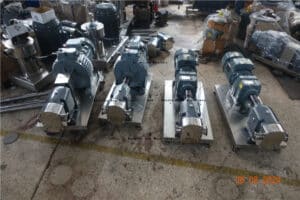A lobe pump is a specialized type of positive displacement pump that has become an essential component in industries requiring reliable, sanitary, and efficient fluid transfer. Known for their robust construction and hygienic performance, lobe pumps are widely used in food processing, pharmaceuticals, cosmetics, chemicals, and biotechnology. Their design allows for gentle handling of products, making them ideal for transferring sensitive, viscous, or abrasive fluids without causing degradation. With rising demands for cleanliness, consistency, and cost-effectiveness, lobe pumps are proving to be the preferred solution for many industrial applications.
How a Lobe Pump Works
The unique operation of a lobe pump sets it apart from other pump types. It consists of two rotating lobes mounted on parallel shafts within a casing. These lobes rotate in opposite directions and create expanding cavities as they turn. This motion draws fluid into the pump chamber on the suction side. As the lobes continue to rotate, the fluid is carried around the casing and discharged on the outlet side when the cavities contract.
A key feature of a lobe pump is that the lobes never touch each other or the casing, which significantly reduces internal wear. This non-contact operation makes the pump suitable for sanitary applications and allows it to maintain performance even when dealing with solid particles or viscous fluids. The smooth, continuous flow also minimizes shear, preserving the integrity of sensitive materials.
Industries That Depend on Lobe Pumps
The design and capabilities of a lobe pump make it versatile across a broad range of industries. In the food and beverage sector, it is used to transfer products such as dairy, sauces, fruit fillings, and syrups. Because of the pump’s gentle action and ability to handle solids without crushing them, it preserves the consistency and appearance of food items, which is essential for consumer satisfaction.
In pharmaceutical and biotech industries, a lobe pump is often employed to handle sterile solutions, active ingredients, and suspensions. Its ability to meet stringent hygiene requirements through clean-in-place (CIP) and sterilize-in-place (SIP) capabilities makes it ideal for operations where product purity is critical. Stainless steel construction and precision engineering ensure compliance with industry standards.
The chemical industry also benefits significantly from lobe pump technology. These pumps can transfer corrosive, abrasive, or high-viscosity fluids with minimal risk of leakage or system damage. Their ability to operate under varying pressure conditions with consistent accuracy makes them suitable for metering, dosing, and batch processing tasks.
Advantages That Set Lobe Pumps Apart
One of the most appreciated advantages of a lobe pump is its low-shear handling of fluids. This feature is particularly valuable when dealing with emulsions, suspensions, and other shear-sensitive products. Unlike centrifugal pumps that can cause turbulence and break down delicate structures, a lobe pump ensures smooth and consistent fluid movement.
Another benefit is its self-priming capability. This allows the pump to draw fluid into the system without requiring the line to be pre-filled. For operations that require regular starts and stops or intermittent flow, this feature provides added convenience and operational efficiency.
Maintenance and serviceability are also strong points of the lobe pump. The design allows for easy access to internal components, and lobes can be removed or replaced without dismantling the entire pump. This reduces downtime and makes routine cleaning or servicing more manageable, especially in industries with tight production schedules.
Sanitation is another core strength. A lobe pump is typically constructed with polished surfaces and minimal dead zones, preventing product buildup and contamination. The seamless design supports thorough cleaning and sterilization processes, which are essential in food, pharmaceutical, and biotech environments.
Factors to Consider When Selecting a Lobe Pump
Selecting the right lobe pump for an application requires careful consideration of several factors. The type of fluid being handled is critical—its viscosity, abrasiveness, and temperature must all be accounted for. Additionally, the pump’s materials must be compatible with the chemical composition of the fluid to ensure durability and prevent corrosion.
Flow rate and pressure requirements also influence the choice of pump model and size. For high-viscosity or high-pressure applications, the pump must be capable of maintaining performance without compromising fluid integrity. It is also important to assess the level of hygiene required, especially for applications in regulated industries.
Energy efficiency is another important consideration. A lobe pump offers a favorable energy-to-output ratio, especially when compared to high-speed alternatives. Its ability to deliver consistent flow with lower energy consumption can contribute to significant cost savings over time.
Innovations and the Future of Lobe Pump Technology
Leading manufacturers like Ace Lobe Pump continue to innovate, pushing the boundaries of what a lobe pump can achieve. Advances in rotor geometry, sealing mechanisms, and material science are improving pump performance, lifespan, and application range. Modular designs now allow for greater customization, letting customers tailor their pumps to exact specifications.
Automation and smart pump technology are also shaping the future of the industry. Modern lobe pumps can be integrated with sensors and control systems that monitor performance in real time. This enables predictive maintenance, system optimization, and remote management—features that reduce downtime and enhance operational reliability.
Conclusion
A lobe pump represents a powerful combination of precision, hygiene, and adaptability in fluid handling technology. Its ability to manage sensitive, viscous, or abrasive materials with minimal shear and maximum reliability makes it an essential tool in many industries. Whether in food production, pharmaceuticals, cosmetics, or chemicals, the lobe pump continues to outperform traditional pumping systems in terms of efficiency, cleanliness, and durability. As demands for better performance and sustainability grow, companies like Ace Lobe Pump are setting new benchmarks in innovation and engineering excellence, delivering solutions that meet the needs of modern industrial processes.






























